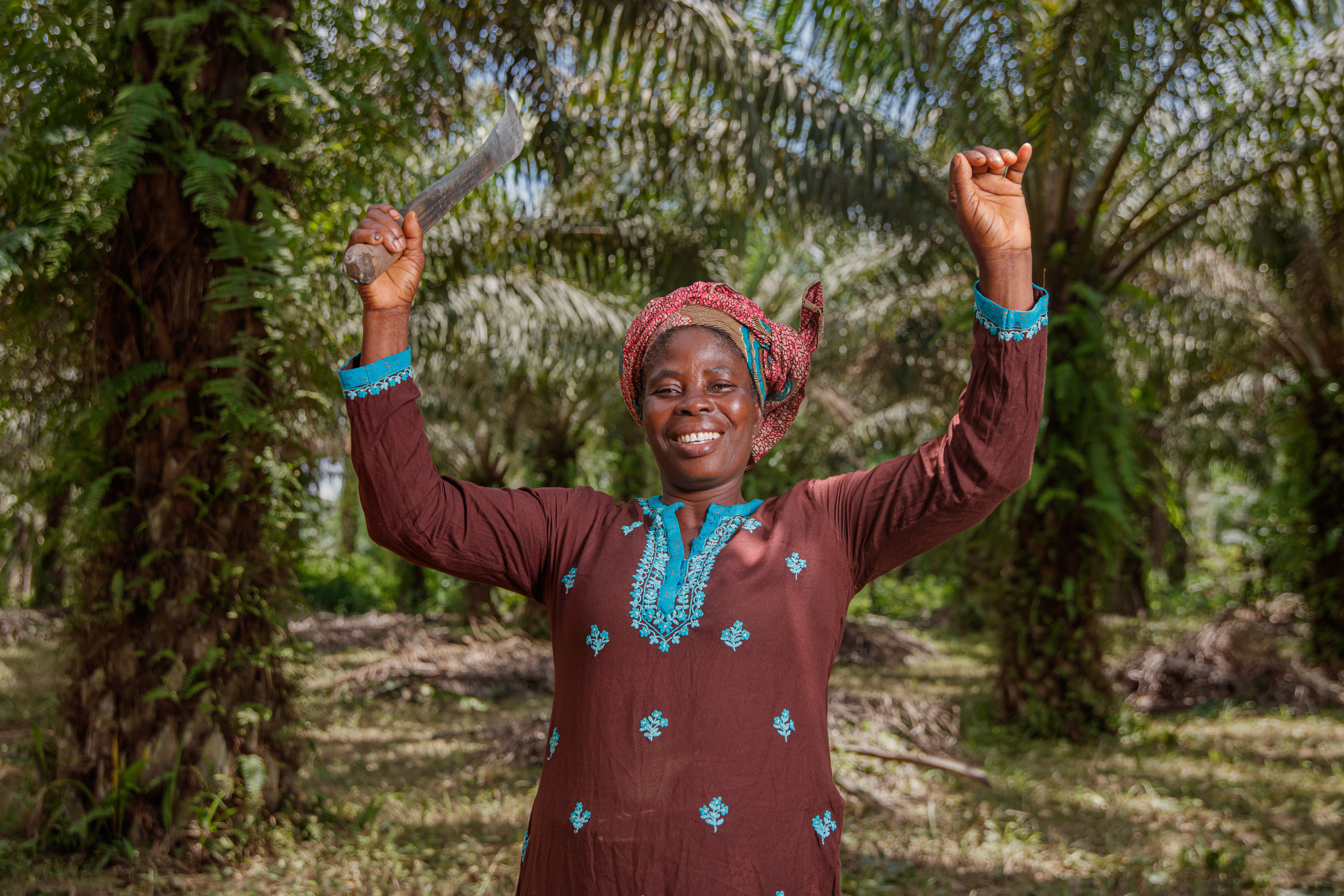Highlights
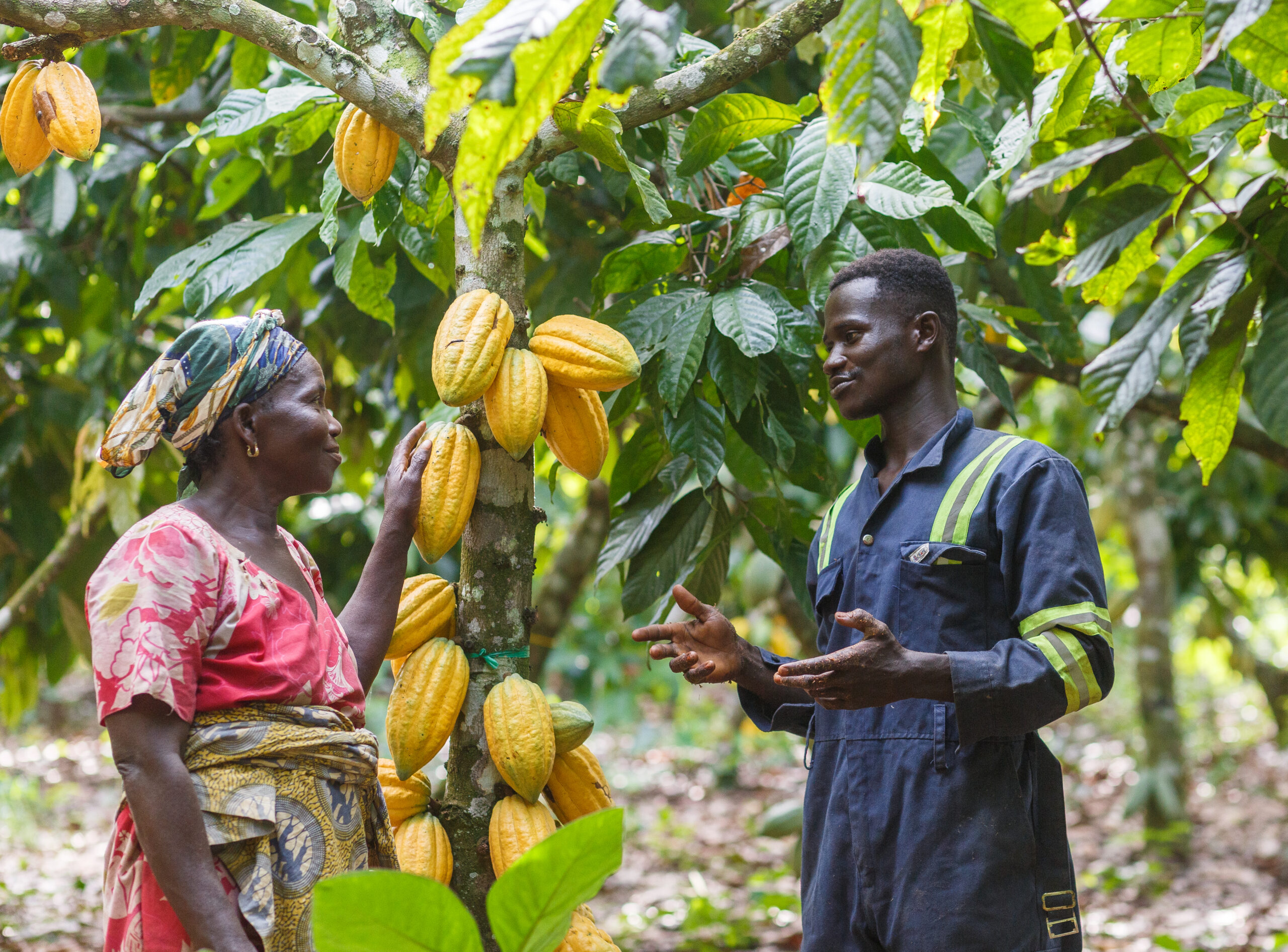
Cocoa
We trained 14,375 new cocoa farmers on good agricultural practices and crop diversification techniques to enhance productivity and profitability, with 85 percent previously trained farmers reporting an increase in yield and income. In Ghana, we raised 105,000 cocoa seedlings, which were distributed to and planted by 181 farmers. We contributed to developing the first cocoa-coffee policy, launched by the Liberia Agriculture Commodity Regulatory Authority.
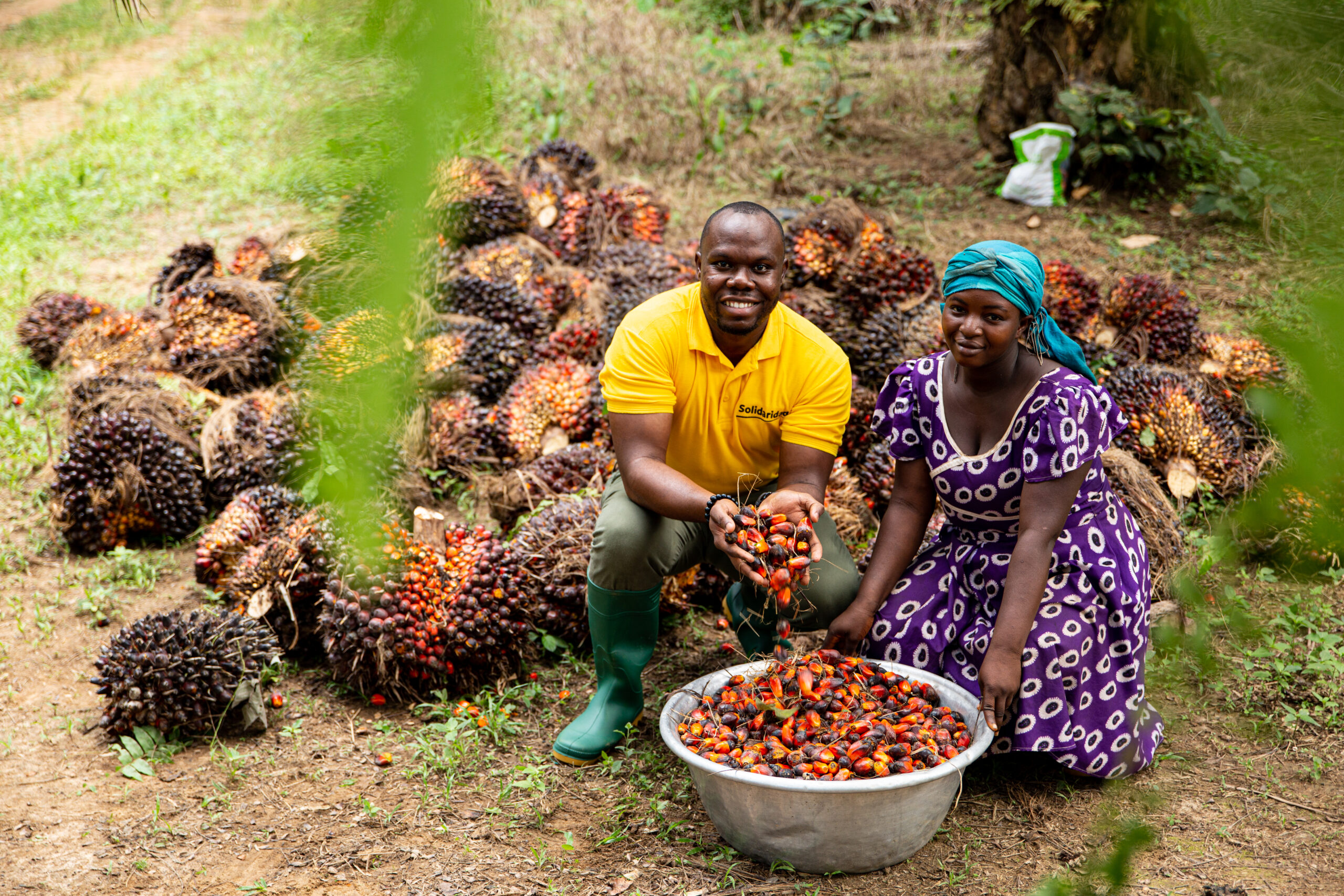
Palm oil
We raised more than 520,000 seedlings, out of which 479,881 were distributed for replanting, reclamation and promoting livelihood diversification. In Ghana, more than 2,800 oil palm farmers were trained in climate-smart agriculture. In Nigeria, 327 trained artisanal mill operators improved their milling practices.
We convened a stakeholder dialogue with the technical working group on oil palm in Sierra Leone on the need for a national oil palm policy to guide production, processing and export of oil palm.
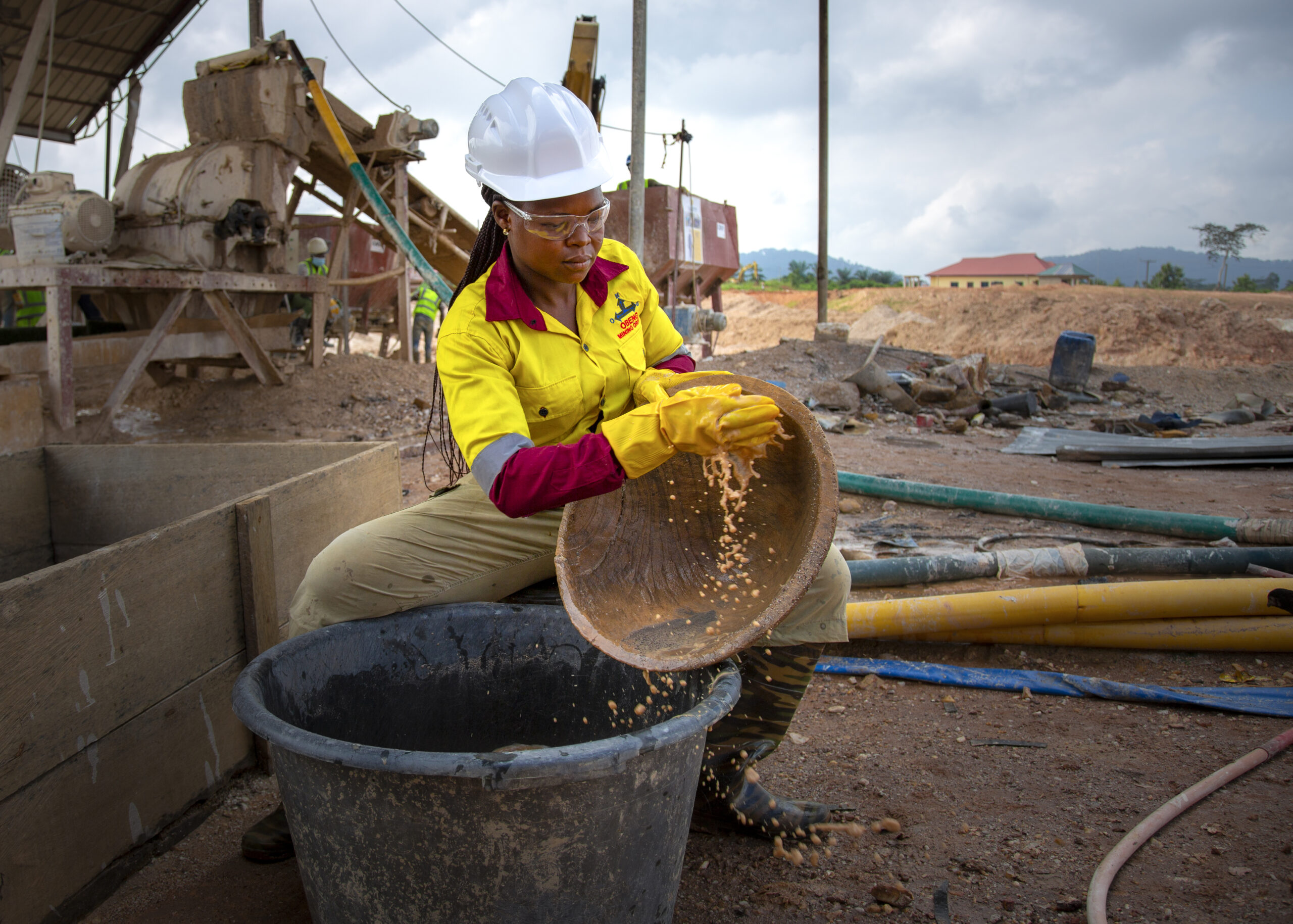
Gold
We developed a digital traceability platform for the artisanal small-scale mining sector with the support of Minnex, a digital technology solution company. Eight mines received training on the use of the platform leading to the export of the first fully traced gold (11.62 grams) from Ghana. As part of best mining practices and legal requirements, we supported two mines to reclaim 2.6 hectares of mined-out lands.
We also supported Ghana’s Minerals Commission to develop a draft National Child and Forced Labour Eradication Framework.
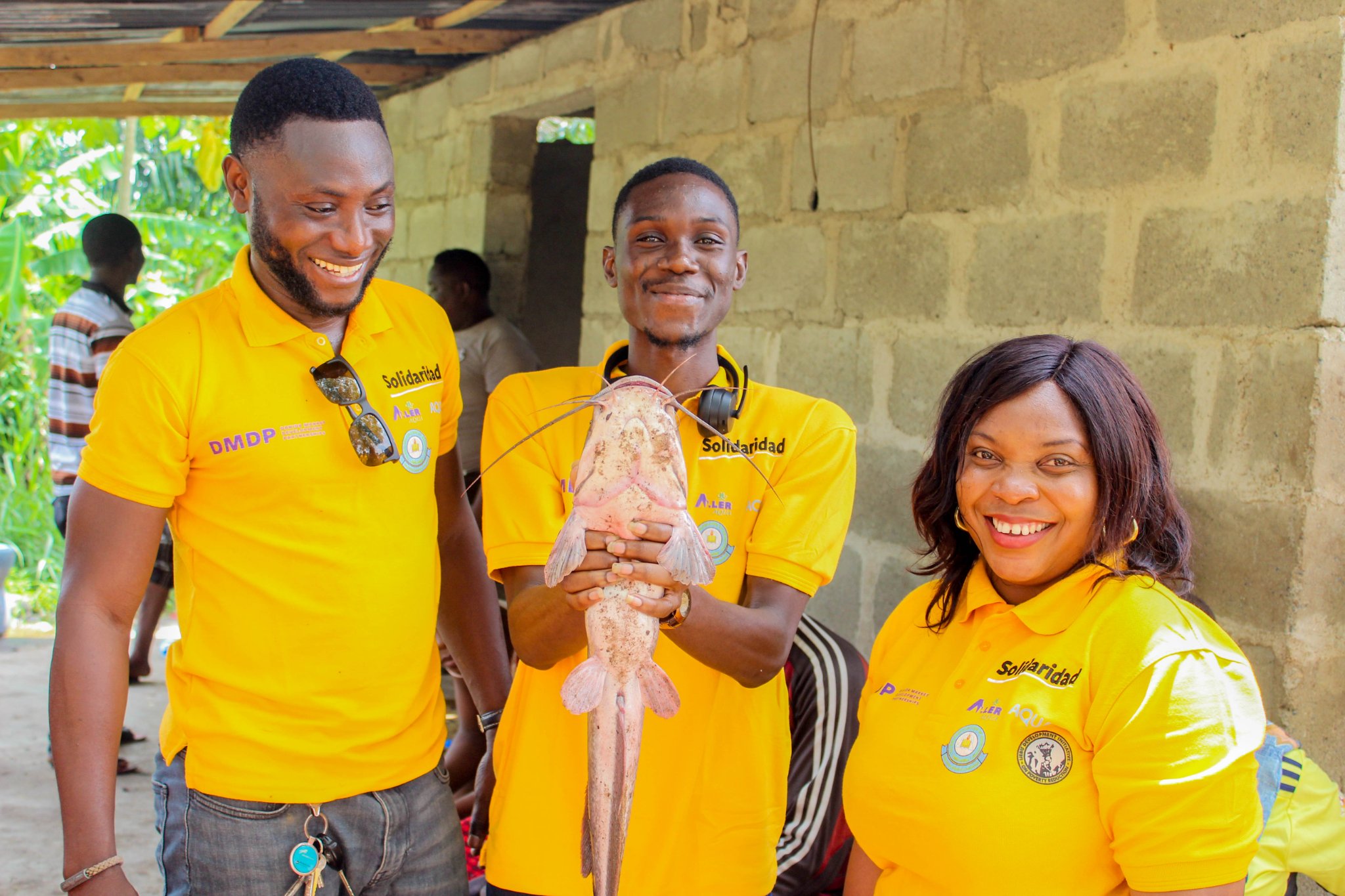
Aquaculture
To promote aquaculture as a source of livelihood in Nigeria, we have onboarded 682 students and 542 smallholder farmers into the aquaculture project. An electronic learning, trading and farm management platform is under development and will soon be fully integrated into the academic syllabus of Tai Solarin College of Education.
To reduce pollution, a renewable energy installation is to power the Eriwe fish farm village
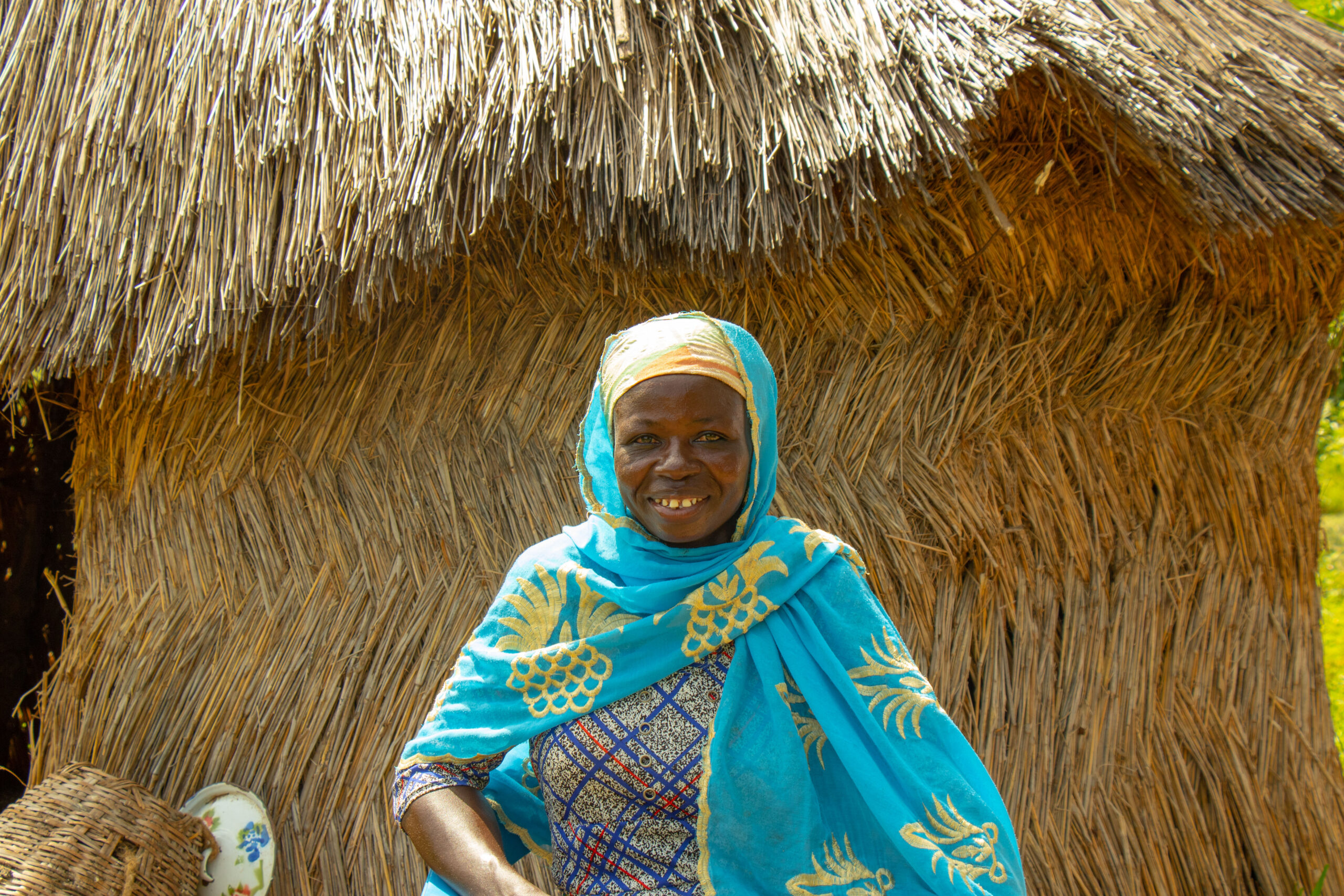
Shea
In 2022, 1,559 shea nut collectors and processors were trained in business management in ten processing centres. A health and safety needs report and a training curriculum with materials were developed. Additionally, 791 community members were sensitized on the importance of the shea tree and the risks of deforestation.
172 episodes of a radio program to mobilize, educate, and create awareness on issues pertaining to the sustainability of the shea supply chain have been broadcasted on two radio stations in Ghana.
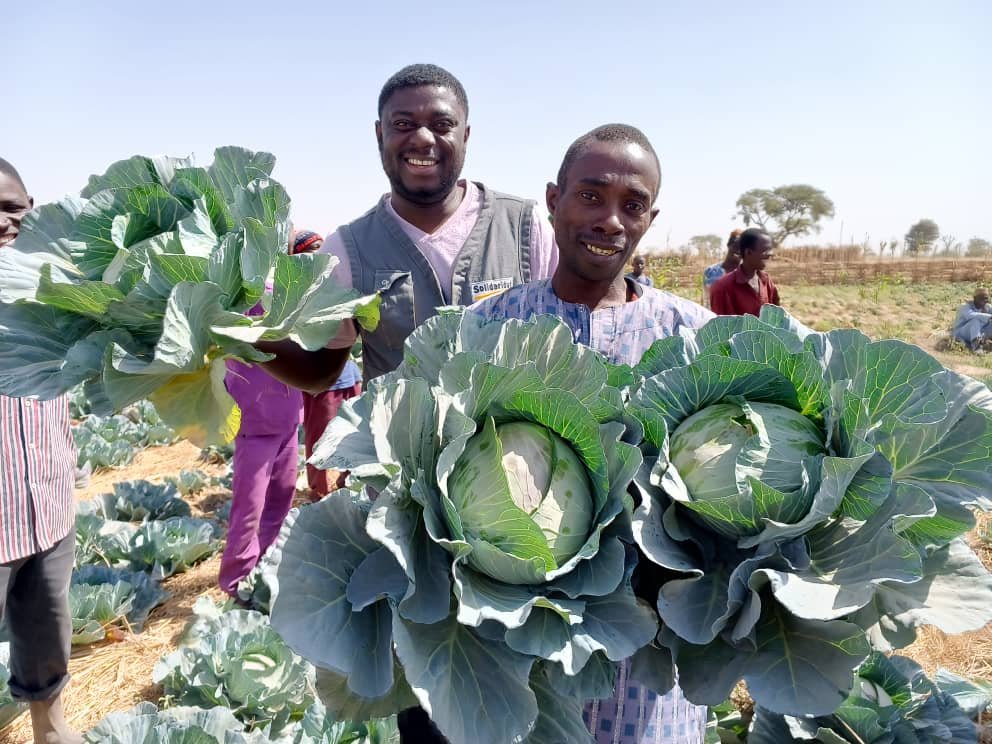
Fruits and Vegetables
In 2022, Solidaridad collaborated with AgroXchange to introduce a digital platform for crop monitoring. A total of 5,733 smallholder farmers, including women and youth, were trained in good agricultural practices and financial literacy. 95 communities were sensitized on the benefits of vegetable farming as a business and improved family nutrition.
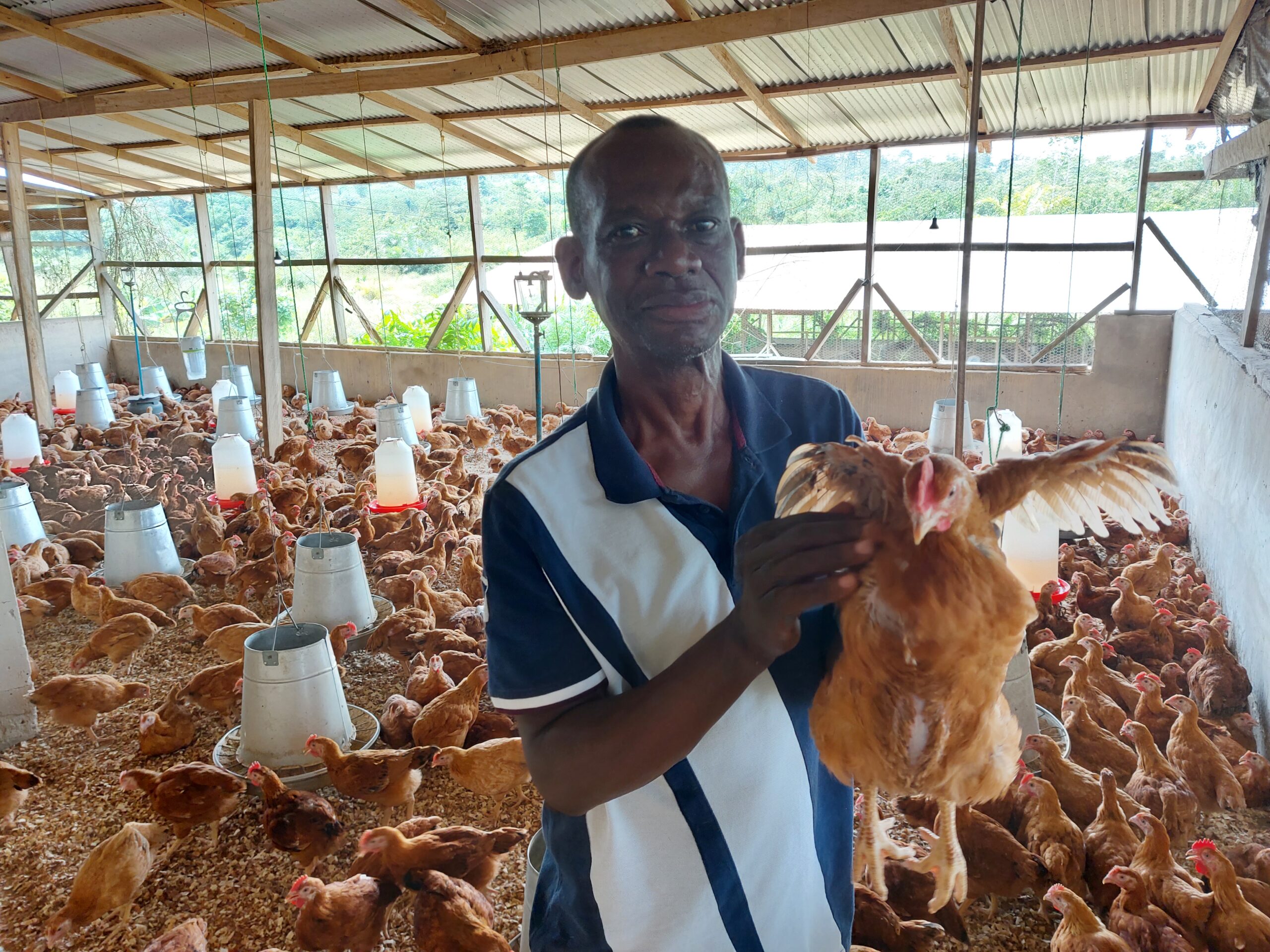
Poultry
We supported the formation of 16 Village Savings and Loans Association groups made up of 149 smallholder poultry farmers. They also received financial education. Additionally, we engaged a financial institution and the Ghana Agricultural Insurance pool to design a financial product that offers credit and insurance for the farmers.
Farmers now have access to quality day-old chicks as a result of the operation of a breeder farm and hatchery set up in Ghana. Seventeen farmers across five project districts who purchased a total of 4,750 chicks recorded much lower mortality rates of less than 1.5 percent as of the end of 2022.
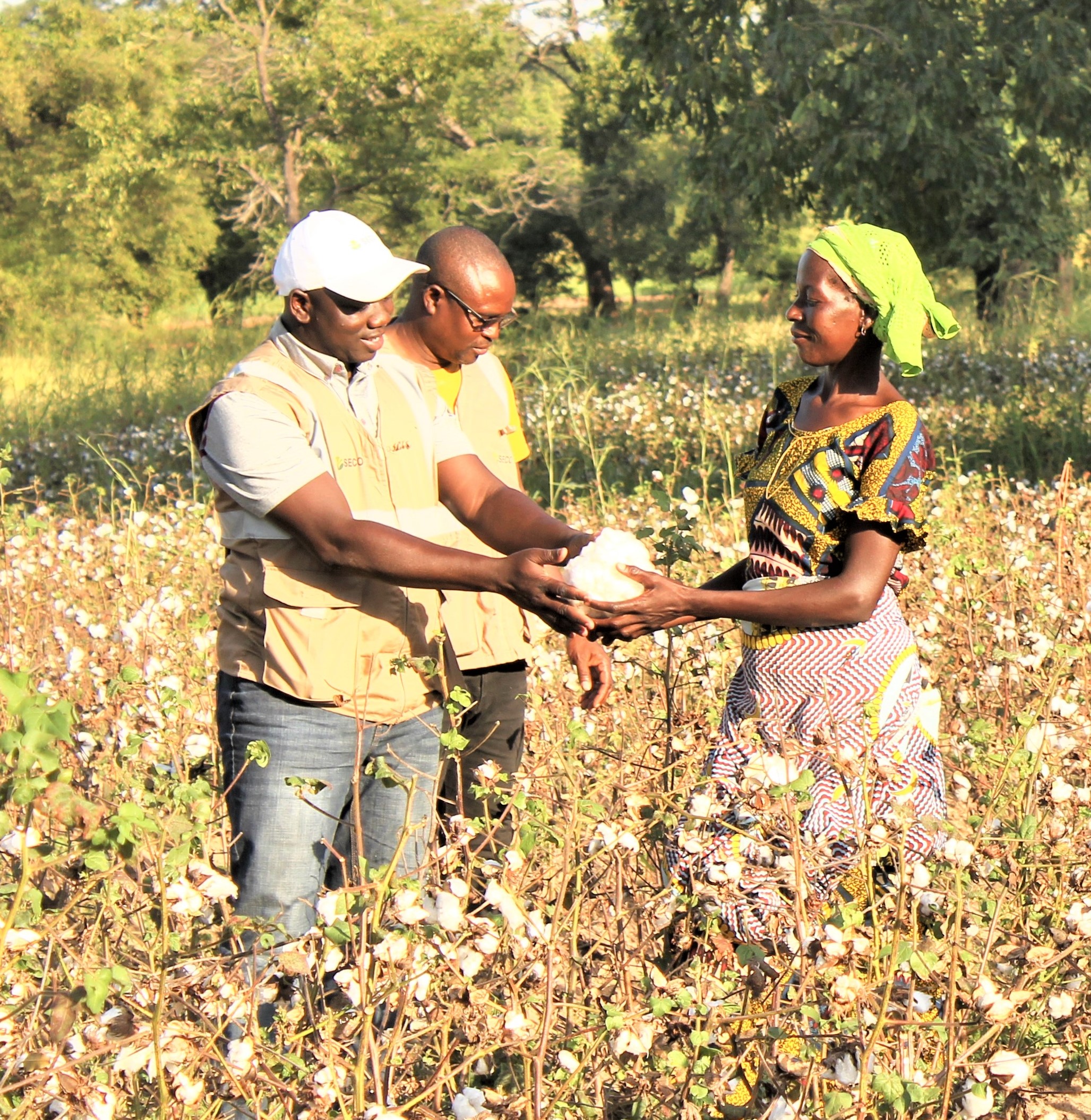
Cotton
We engaged more than 32,500 farmers and 606 cooperatives in Cote d’Ivoire, Togo and Chad. Solidaridad, in partnership with OLAM Agri, carried out sensitization and awareness sessions with beneficiaries, as well as partners. We trained 4,146 cotton farmers on gender and child labor, as well as on climate-smart environmental practices, and Village Savings and Loans Association schemes.
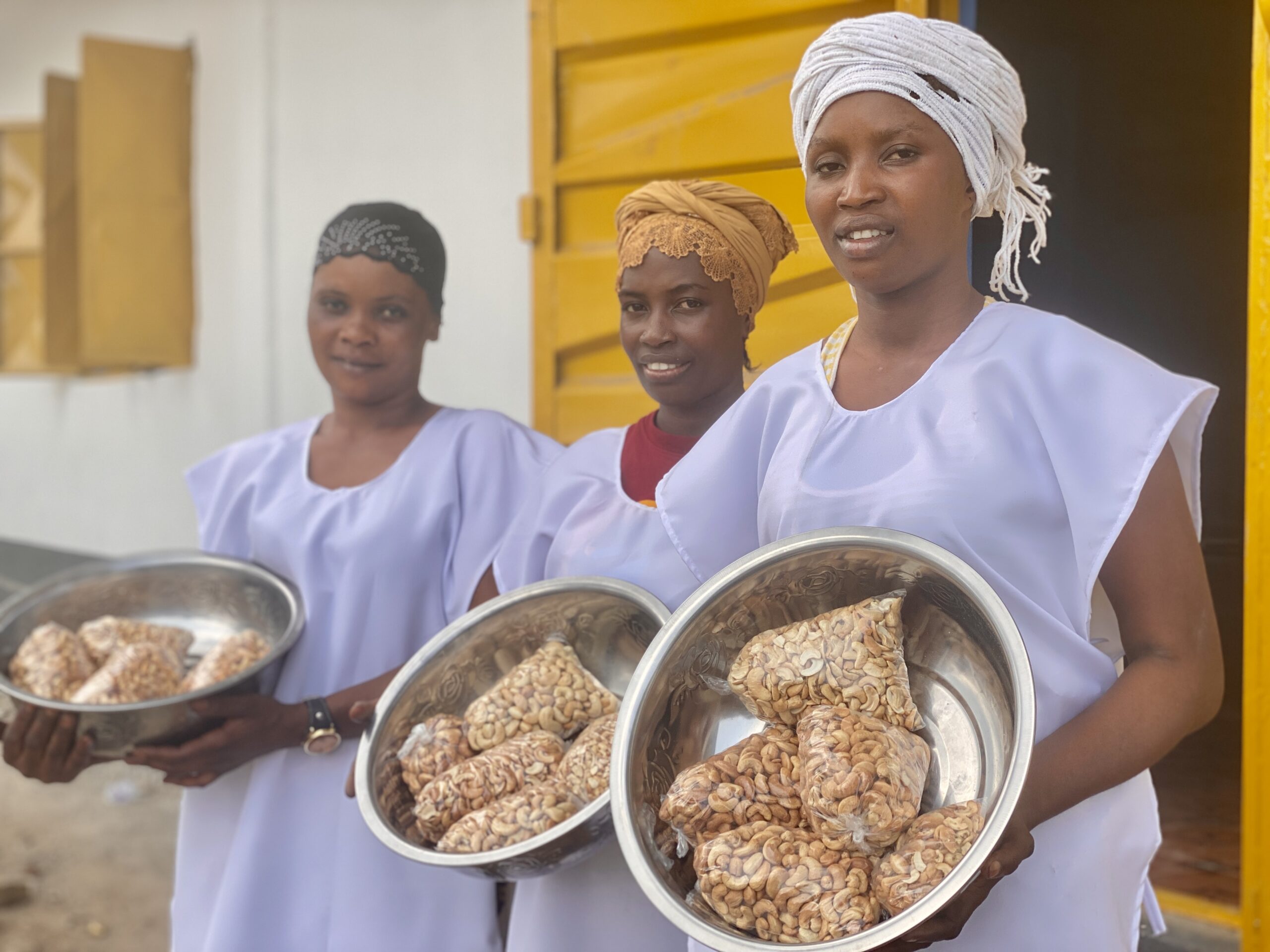
Cashew
In Sierra Leone, we established nine farmer support centres across the 12 operational districts to ensure farmers’ access to inputs, tools and extension support for cashew cultivation. A total of 33,602 cashew seedlings were distributed to 4,500 farmers to improve productivity.
Additionally, a mini cashew processing factory is being constructed to improve the quality of processed nuts, create backward linkage for production, and reduce hazardous contamination from locally produced cashew nuts.
Results

6,870
farmers with income increase
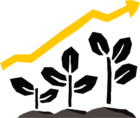
12,200
farmers with increased yields

405
corporates testing Solidaridad solutions
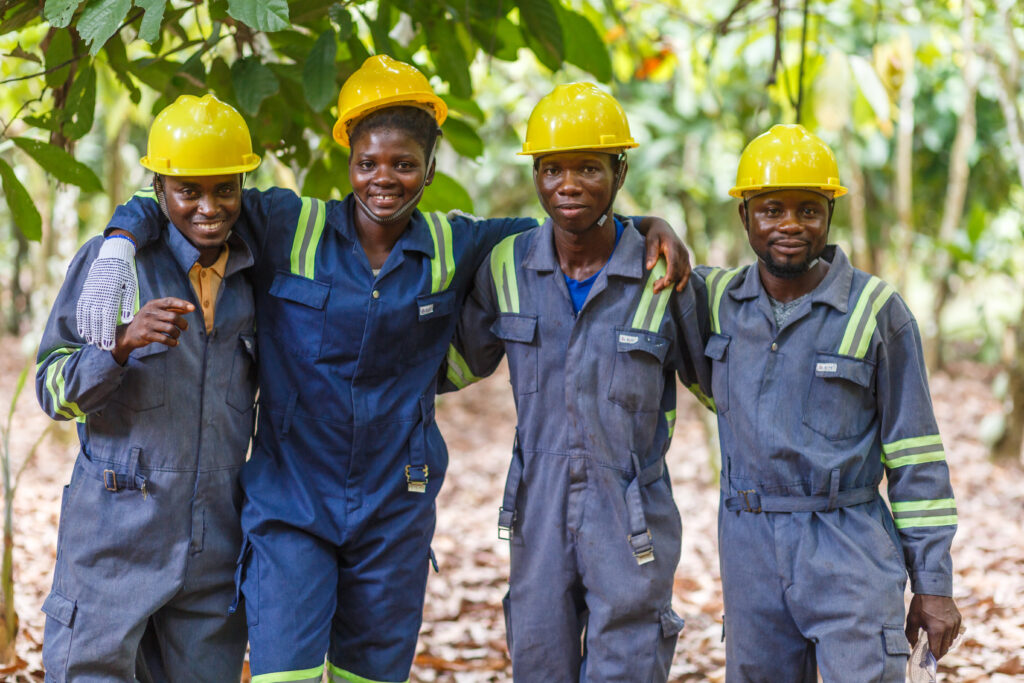
A multi-faceted approach
Deepen impact in four intervention areas
To meet our overarching goal of reducing poverty through the optimization of the productivity of supply chains while balancing this with responsible utilization of natural resources, we work on four interconnected results areas — Good Practices, Sustainable Business Ecosystems, Market Uptake and Enabling Policy Environment. Below are some of the strides we made in 2022.
In 2022, we continued our work to improve the production practices of 16,478 producers and workers using 402 demonstration plots and 224 farmer field schools. In Sierra Leone, a total of 5,182 hectares of cocoa, coffee and cashew farms were brought under climate-smart agricultural practices. Additionally, 6,870 farmers improved their incomes after applying the knowledge they received through training.
Over 600,000 cocoa, cashew, oil palm and economic tree seedlings were raised. This includes a total of 104,901 cocoa seedlings planted on 95 hectares of land in Ghana. An additional 32,000 oil palm seedlings are being raised to reclaim degraded lands under the Climate Resilient Oil Palm Production project.
Solidaridad trained 106 Village Savings and Loans Associations (VSLAs) made up of 1,500 smallholders in financial literacy and additional livelihood activities to empower them financially. Due to the training on financial literacy, 75 associations in Liberia were able to mobilize 12,593.63 dollars to invest in their cocoa farms and additional livelihood activities.
In Ghana, 106 VSLA groups were established and trained to timely detect, monitor, and prevent child labor-related issues within the communities. Twenty communities were also sensitized on these issues using training materials from the Forced Labor Indicator Project.
In Côte d’Ivoire, 70 children, including 28 girls identified as part of child labor cases, have been enrolled into the formal educational system after being remediated through bridging classes.
The ILO, as part of its Accelerating Action for the Elimination of Child Labour in Supply Chains in Africa (ACCEL) project, engaged Solidaridad to train key artisanal and small-scale gold mining stakeholders in Nigeria, Mali and Cote d’Ivoire on the CRAFT Code due diligence process. The aim was to promote a process of formalization in the sector through the implementation of the CRAFT Code with a specific focus on child labor risks. A total of 225 stakeholders were trained.
As part of efforts to sustain the adoption of responsible mining practices among mines in Ghana, Solidaridad introduced three artisanal small-scale mining technologies – Goldkatcha, Shaking Table and Sika Bukyia – to miners. Two mines were supported to reclaim 2.6 hectares of mined-out lands with economic trees. These lands were given back to the landowners.
In 2022, we enhanced farmers and workers access to finance, market information, farm inputs and sustainable production practices. Solidaridad supported the formation of 106 Village Savings and Loans Associations (VSLAs) with 1,500 members. In Sierra Leone, 70 associations mobilized 44,417 euros to invest in their farmers and other income-generating activities.
In Ghana, 200 farmers were profiled and their farms mapped to generate credit scores as a means of de-risking them. These farmers were linked to a financial institution to enable them to acquire loans to access services provided by the youth-led Rural Service Centres. The Ghana Incentive-Based Risk Sharing System for Agriculture Lending also accepted to guarantee the loan for the farmers. Additionally, an interactive tool, the Farmex App, was developed to enable all players to interact and transact sustainable business.
To promote the adoption of best management practices by farmers, Solidaridad built the capacity of two youth-led small and medium enterprises that are currently providing farm services to farmers — many of whom are aging and are unable to tend the farms — and creating an ecosystem of service delivery, yield improvement and market linkages.
In Cote d’Ivoire, we strengthened the capacity of 132 women to improve the management of their small-scale businesses through training in entrepreneurship skills, financial literacy and income-generating activities.
In Nigeria, we built the capacity of 36 agro-input dealers to provide quality products, improved services, and market advisory information to smallholder fruits and vegetable farmers. Additionally, an array of digital tools and platforms, including the Cobalia farm management tool and the electronic trading platform, were developed under the aquaculture project to provide production tools for students, farmers and off-taker services, as well as to improve market linkages. These tools have been designed to be self-sustaining and financed by the proceeds from the platforms.
In 2022, we engaged four financial institutions, equipment suppliers and service providers to facilitate access to finance, services, and equipment for small-scale miners. Five mines were further profiled to ensure effective linkages to these institutions. Additionally, Solidaridad and Pact organised a Shark Tank event to allow interested mines to pitch their operations to attract investors. Some participating mines were supported to acquire mercury-free equipment and prepare business plans.
In 2022, we convened eight stakeholder dialogues and worked on various advocacy activities to promote sustainable supply chains. In Ghana, we convened a policy dialogue on oil palm price mechanism with value chain actors. This was the first time industry players, including oil palm producers, processors, civil society, and government agencies, came together to build a consensus on a minimum and maximum price for fresh fruit bunches. Following this, the price mechanism document was accepted and adopted by the government and a price for the 2023 fiscal year was set. Presently, farmers are able to predict their income and effectively plan with it.
Our work within the gold sector supported the Minerals Commission, which is the regulatory body for mining in Ghana, to develop a draft National Child and Forced Labour Eradication Framework. The framework aims to reduce children’s involvement in mining activities by 50 percent in the next five years.
We initiated inclusive stakeholder dialogues on land rights and provided technical assistance to the Lands Commission of Sierra Leone. Following extensive consultation, two land bills were passed into the National Land Commission Act 2022.
In Liberia, an effort to foster sustainable production and consumption toward inclusive and sustainable supply chains was made by collaborating with the Liberia Agricultural Commodity Regulatory Authority (LACRA) to launch the country’s first Cocoa Policy.
In Cote d’Ivoire, we collaborated with OI-REN to convene a stakeholder dialogue to review and address Articles 25 and 27 of the Forestry Code 2019. This led to the development of a policy brief, with recommendations seeking to dissociate tree ownership from land rights.
In Nigeria, we signed 14 Memorandums of Understanding with local government councils and five with the Federal Ministry of Agriculture and Rural Development and the Ministry of Agriculture of four states to ensure the government’s commitment towards sustainable oil palm production in the country. We established multi-stakeholder platforms in 157 communities across 17 local government areas to enable key stakeholders to participate in decision-making aimed at achieving sustainable oil palm landscapes.
In West Africa, we continued to form strategic partnerships with private sector entities in laying down the foundation for sourcing sustainable products through farmer’s associations and producer groups to access local and international buyers.
In Ghana, Minexx, a digital tech solution company, supported the development of a digital traceability platform for artisanal small-scale mines in order to increase the sourcing of responsible gold. This led to the export of the first fully traced gold of 11.62 grams from Ghana.
Our collaboration with Zowasel in Nigeria saw the establishment of eight crop test centres to be used as an aggregation hub for farm produce and to provide ready off-taker markets for sourcing sustainable and healthy food from a network of smallholder palm oil and fruits and vegetable producers. Additionally, an e-trading platform was created for off-takers, retailers, and wholesalers in the aquaculture supply chain using the Cobalia software alongside payment gateways like flutterwave or paystack.
In Liberia, we supported two chocolate manufacturing companies — Redimere and Liberia Cocoa Corporation — in encouraging local consumers to purchase locally-made cocoa products.
Change that Matters Stories
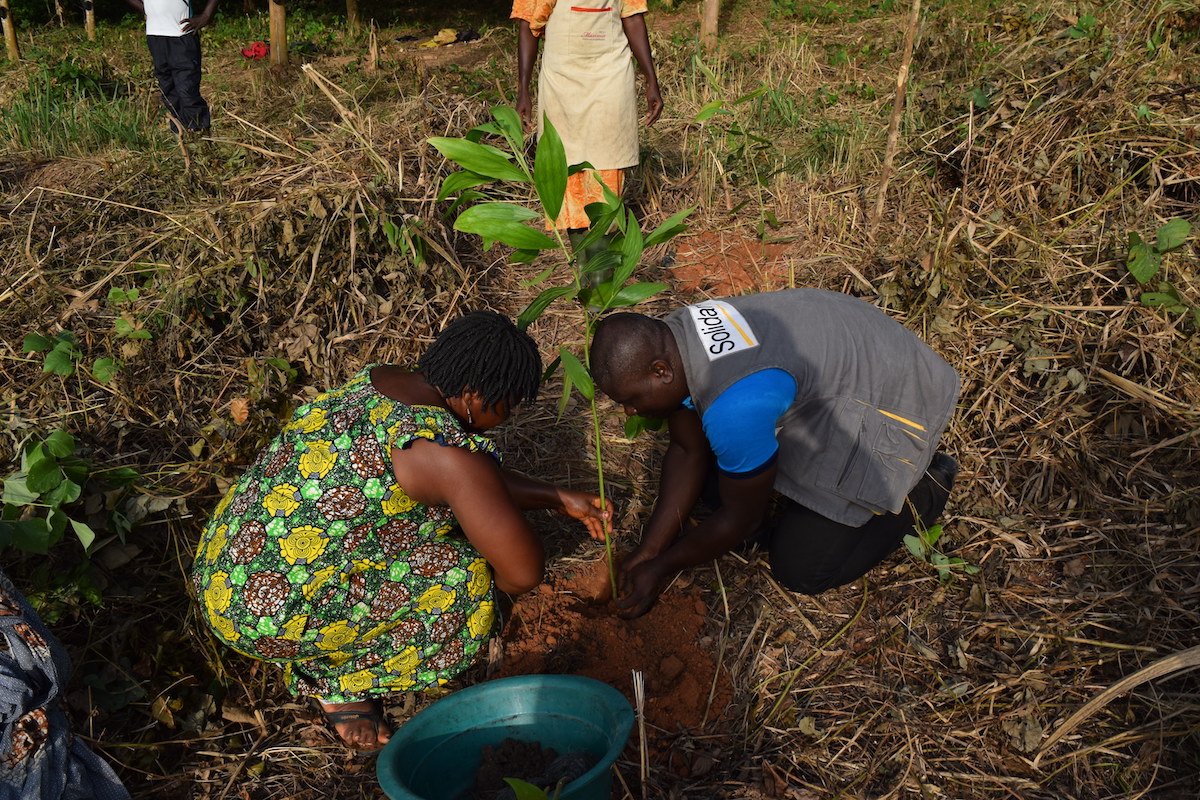
CULTIVATING RESILIENT COCOA THROUGH AGROFORESTRY
For generations, removing non-cocoa trees was standard practice when establishing cocoa farms in Côte d’Ivoire. Conventional wisdom saw trees, no matter the species, as an obstacle to productive farms. Perceptions are changing as the Cocoa Rehabilitation and Intensification Programme (CORIP) introduces the benefits of agroforestry practices to cocoa farmers.
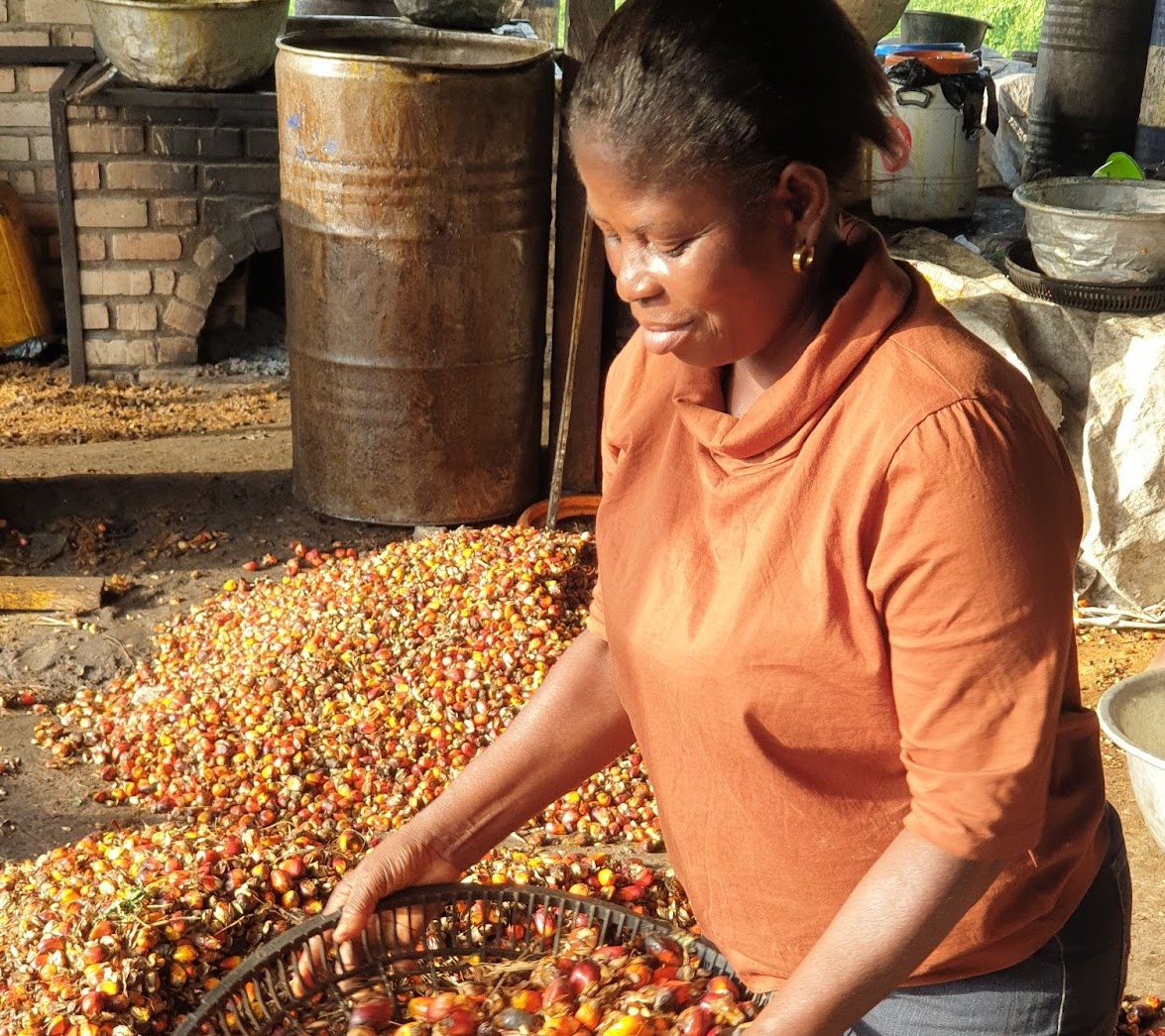
CREATING VALUE FROM WOMEN-LED PALM OIL ENTERPRISES IN GHANA
For Ruth Sackey, the oil palm business is not new. Over the last five years, she has been operating an oil palm processing mill at Ofoase-Panin in Ghana’s Eastern region. Yet, Ruth says this is not her main source of income. Her oil palm field is. She has been growing the commodity for the last 8 years and now boasts of a 25-acre farm.

RAKIA SHAIBU: LOCAL RADIO PERSONALITY AND SHEA NUT COLLECTOR
The Yipielgu community in the Northern region of Ghana is in the heart of the region’s shea parkland where collection and processing of the valuable nuts provides a lifeline to many families. An innovative radio programme is helping people in Yipielgu and surrounding communities improve their practices and livelihoods.
Innovative Sustainability Solutions
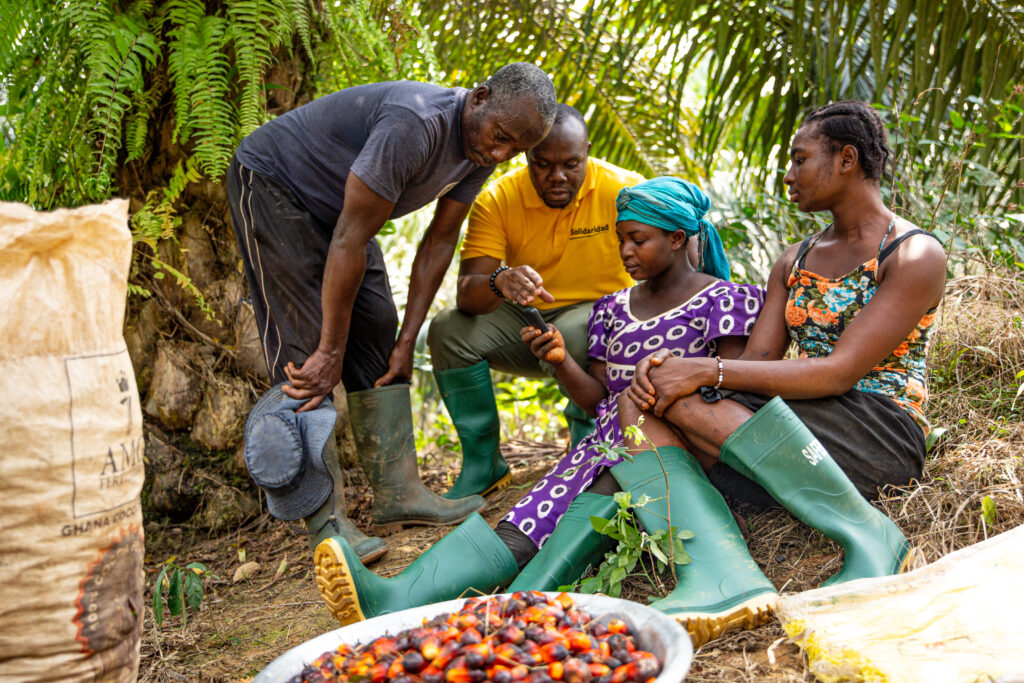
Innovating for change
Transforming supply chains through digital solutions
Digital Solutions are key to scaling up our solutions and achieving impact at scale.
To reduce emissions associated with artisanal processing, and to increase incomes and improve health as co-benefits, Solidaridad developed an improved technology for small-scale oil palm processing that promotes energy efficiency and utilizes waste for energy through methane capture. The Ministry of Environment, Science, Technology and Innovation through the Environmental Protection Agency is co-funding pilots for a potential scale-up in Ghana.
Solidaridad developed a formula in collaboration with oil palm stakeholders to provide a transparent mechanism for determining the prices of fresh fruit bunches in Ghana. The Tree Crops Development Authority, a government agency in charge of regulating tree crop development, adopted the formula. The agency will use it to announce monthly prices of fresh fruit bunches from January 2023.
In 2022, the digital team played a critical role in the testing of the harvest alert platform’s user interface, working closely with key stakeholders such as the Ghana Oil Palm Development Company, AgroQuorum, Assin Mills, and Benso Oil Palm Plantation. The team gathered and analyzed feedback from these stakeholders to ensure that the platform met their essential requirements.
Despite challenges in the first half of the year, which resulted in project delays, the alpha version of the platform and user acceptance testing were deployed successfully.
Solidaridad developed an e-learning and e-trading platform for smallholder fish farmers. The platform will improve smallholder skills and knowledge while creating a market for their products. In addition, an onboarding web portal for Tai Solarin College of Education students has been completed and used to successfully onboard more than 1,000 students.
The e-learning mobile application, which provides fish farmers with access to educational resources, enabling them to improve their skills and knowledge, was also developed and is currently available for download on Google Playstore. The e-trading platform, which caters to both producers and buyers, is in its development phase.
Organization & governance
Working together
A positive environment for learning and collaboration
Deliberate efforts by the regional leadership to sustain a conducive working environment for all staff contributed to high performance. Clients were served better as their feedback helped us to deliver state-of-the-art services to them. Our well-primed staff delivered quality support to farmers, miners and workers to benefit from our supply chain work. We kept an eye on partnerships and contributed thought and experiences to national development priorities.

To achieve the organisational objectives and priorities for 2022 within financial constraints, management readjusted and realigned staff arrangements to ensure maximum utilisation of existing human resources. West Africa successfully completed a comprehensive process to redesign its salary structure to reflect industry labor competition and economic conditions. The region streamlined its employment contracts in response to operational and administrative exigencies.
Managerial Competency Development training was organized for 15 staff within the region, including current and potential managers. The training focused on equipping leaders with the requisite competencies to be abreast of current managerial trends.
New staff was hired for our operations in Chad and Togo.
| Female | Male | Total | |
| Chad | 0 | 1 | 1 |
| Côte D’Ivoire | 8 | 14 | 22 |
| Ghana | 10 | 39 | 49 |
| Nigeria | 7 | 13 | 20 |
| Liberia | 3 | 11 | 14 |
| Sierra leone | 5 | 15 | 20 |
| Togo | 0 | 1 | 1 |
| Total | 33 | 94 | 127 |
Partnerships leading to new business opportunities progressed steadily. Thirty-three proposals were sent out in response to requests for proposals during the year. Thirteen of them were approved while 15 still await a response. Going forward, new strategies have been developed to boost the number of applications, with lessons to improve the success rate.
In 2022, we continued to work with the Ministry of Foreign Affairs of the Netherlands, Mondelez International, the European Union, the Netherlands Enterprise Agency, the Body Shop, Kering, Rainforest Alliance, the Deutsche Gesellschaft für Internationale Zusammenarbeit GmbH, Danish International Development Agency, and East-West Seed, among many others.
The region improved monitoring by deploying and piloting a regional activity tracker. This was to help register target groups participating in activities and capture progress for decision-making and effective programme implementation. A program implementation plan dashboard was developed to track the progress of implementation. Data quality audit processes and data flow charts were also developed for piloting in the ensuing year.
Three key studies were conducted. They are Baseline for the programme Edeka farmers, Baseline for the FVO shea project and a situation assessment for cocoa farmers in Nigeria. A monthly outcome monitoring process which follows the network data model framework was set up for our NISCOPS programme in Ghana. The results from the monthly monitoring confirm that while farmers are pleased with training efforts, it may take time for them to adopt and implement the entire set of practices. The tracking process will be replicated in the following year for comparisons.
Three knowledge products were produced for internal and external use. The external product focused on highlighting our work — approaches, successes and lessons — in using the village savings and loans association concept as a vehicle for enhancing financial inclusion for smallholders across the cocoa, oil palm, cashew and gold supply chains in West Africa.
One of two other products purposely developed for internal learning focused on our strategies employed in gender mainstreaming, key challenges and workaround solutions, as well as new strategic approaches that could be explored to advance our gender mainstreaming agenda.
To document the lessons learned in leveraging multi-stakeholder partnerships for climate-responsive policies in the oil palm sector in Ghana, we developed an internal product under the NISCOPS project.
Solidaridad was recognised as an organization with expertise in land tenure at the 2022 National Land Conference in Ghana. Our experts had the opportunity to discuss with different stakeholders some successes under the Advocacy for Change Project, which was implemented between 2016 and 2020.
In his presentation at the Land conference, Dr Winston Adams Asante, Technical Advisor, Climate Change & Natural Resources at Solidaridad West Africa touched on the major causes of conflict in land tenure agreements, interventions introduced by Solidaridad and the impact of these interventions.
The presentation generated a lot of enthusiasm among the traditional leaders, who asked for help in setting up similar projects in their communities.
With a combined followership of more than 12,562 on our West African social media platforms (Facebook, Twitter and LinkedIn), corporate visibility improved through regular posting of relevant content on these platforms. Over 1,156 key project activities and results were widely disseminated to reach external audiences.
Branded materials and brochures, as well as 47 short videos, were produced to demonstrate programme outcomes and enhance corporate visibility and communication. The region contributed 31 news articles and success stories for publication on the Solidaridad global website.
Three regional newsletters publicised new interventions and showed the results of our work. Additionally, two publications were developed to demonstrate the impacts of the Cocoa Rehabilitation and Intensification Programme and the Sustainable West Africa Palm Oil Programme on the lives of beneficiaries.
Utilising strategic media engagements, the work of Solidaridad was highlighted in multiple print and digital media, including television and radio in all seven operational countries. Solidaridad secured 20 speaking slots for senior officers to engage stakeholders on relevant themes within the region and participated in campaigns to promote land rights, gender and youth inclusivity in sustainability programmes. We participated in 14 events within the region to showcase our work in the various supply chains we intervene in.
In 2022, the digital team participated in the YODA hackathon, supporting the co-designing and building of a Proof of Concept Data warehouse with four other regions: East and Central Africa, South Africa, Asia, and Europe. The Data warehouse was powered by various data sources from the four regional offices and was visualized on a dashboard. This achievement showcased the team’s ability to collaborate with other teams and deliver a functional data solution. By centralizing and integrating data from various regions, the Data warehouse will significantly enhance our ability to analyze and make data-driven decisions.
We vigorously pursue disciplinary or other actions necessary against perpetrators of any inappropriate behavior. In view of this, an Integrity Advisor and Person of Trust was fully trained and awareness was created for all staff. The way(s) (suspected) incidents or behavior can be reported safely and how (if any) reports of inappropriate behavior are handled can be found in Solidaridad’s whistleblower policy.
Finance
Income
The 2022 income is slightly lower by 0.3m euros compared to 2021 and higher than the budgeted income of 5.9m euros. Actual income realised from operations in 2022 amounted to 12.3m euros, which constitutes 65% of own income generated and 35% generated through other Solidaridad entities. This demonstrates the continuous efforts to diversify our fundraising efforts to other non Dutch-based development partners.
Income from private companies constitutes 15% of our income, slightly higher than what was achieved in 2021. There have been greater efforts to deepen fundraising ties with the private sector companies in West Africa, particularly in the cocoa supply chains.
Income from governments represented 15%, a significant reduction in results achieved in 2021. A number of programmes funded by government grants ended in 2021, hence the reduction in income. Income from other organisations such as the European Union, World Bank, foundations and other entities constitutes 44%. The signing of a new European Union grant, World Bank and Latter-days Saint in Sierra Leone contributed to an increase of 52% from 2021.
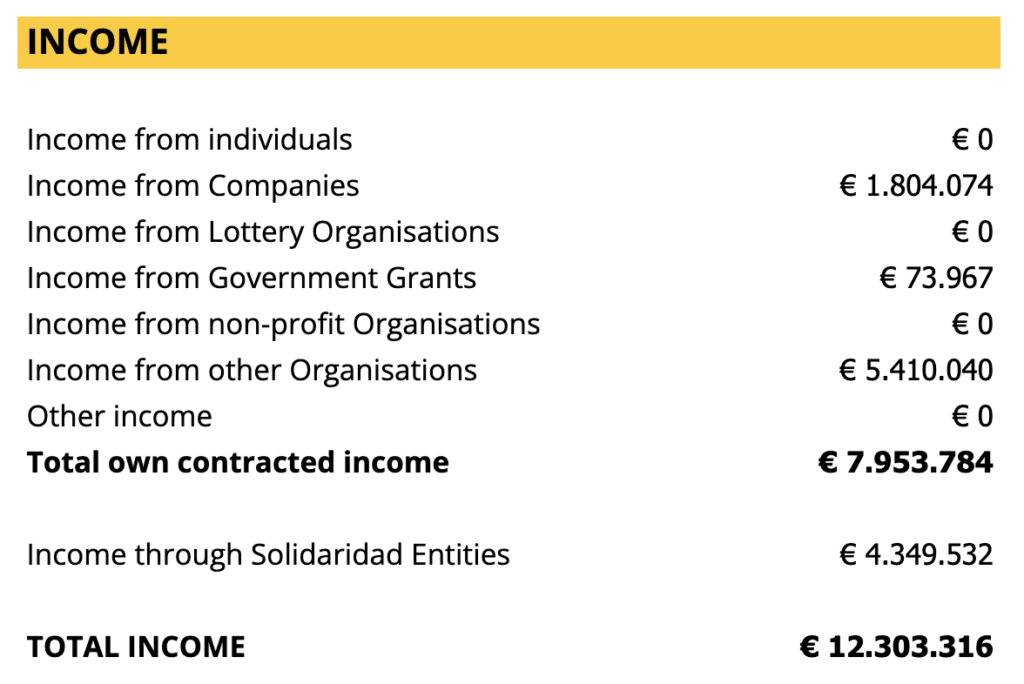
Expenditures
Total expenditure incurred in 2022 was 12.3m euros, representing a reduction of 3% compared to 2021 expenditure. Employee expenses represent 21% of total expenditure. Despite some programmes ending in 2021, a significant number of staff were maintained to manage existing programmes and to pursue new funding opportunities. A contribution of 2% of regionally generated income is paid to the Network Secretariat for providing support to our work in the region.
An amount of 9.6m euros representing 77% of the total expenditure of 12.3m euros was spent on activities and partner costs. Cocoa continues to be our major commodity in the region and constitutes 47% of our expenditure followed by oil palm programmes with 33%, Gold 7% and climate, food security and other projects constitute 12%.
We ended the year with a deficit of 74,455 euros.
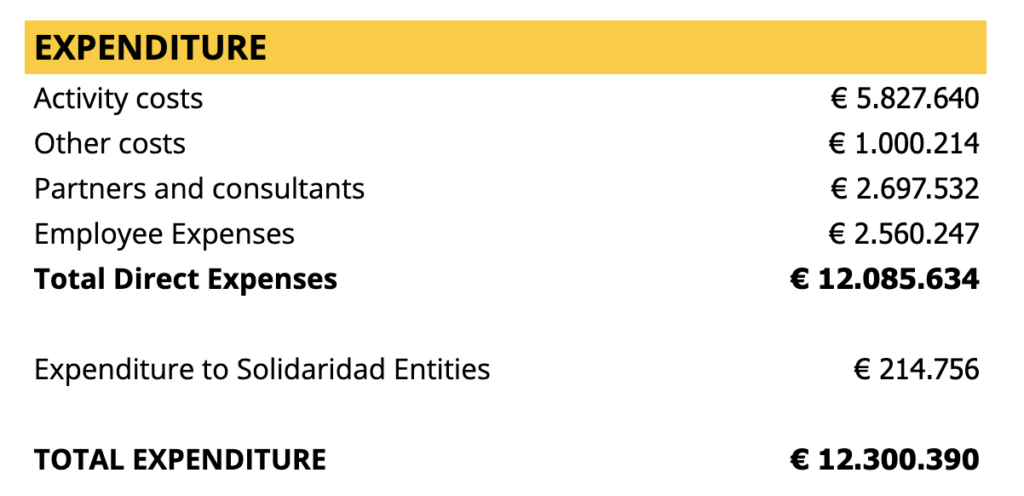
The full audited annual statements are available below.

